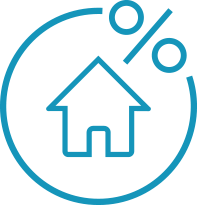Exploring five-year fixed rate mortgages
Choosing the perfect mortgage can be overwhelming, but if you've already decided on a fixed rate mortgage instead of a variable one, there's another important decision to make: how long do you want your fixed rate to last? Among the most common options are 2, 3, 5, and 10 years. In this article, we'll delve into the details of a five-year fixed rate mortgage and discover the advantages it can bring to you.

What is a five-year fixed rate mortgage?
A five-year fixed rate mortgage is a type of mortgage that maintains a consistent interest rate for a period of five years from the beginning of the loan. This means that your monthly payments will remain the same throughout this duration, providing you with stability and predictability for your budget. Even if interest rates rise during this time, your payments won't change. Opting for a fixed rate mortgage can be a smart move if you anticipate potential increases in interest rates. Once the fixed term is over, your mortgage will usually switch to a variable rate or give you the option to select a new fixed-rate deal.
Should I get a five-year fixed rate mortgage?
With a five-year fixed-rate mortgage, you can rest easy knowing the precise cost of your mortgage for the next five years. This makes it an excellent option if you have a strict budget or concerns about potential interest rate increases. It also offers a longer period of stability compared to a two-year fixed rate mortgage.
Moreover, if you expect to remain in your current home for at least five years, a five-year fixed rate mortgage provides stability and minimizes the impact of future interest rate changes. It allows you to plan your finances more accurately and confidently.
Advantages
- Your monthly payments remain unchanged for five years, even if interest rates increase.
- Knowing the exact amount you'll pay each month facilitates better financial management.
- If interest rates rise, you may end up paying less than you would with a variable-rate mortgage.
- After five years, you can switch to a new mortgage deal without incurring Early Repayment Charges (ERCs).
Disadvantages
- Initially, five-year fixed rate mortgages tend to have higher interest rates compared to variable rate mortgages.
- If interest rates decrease during the five-year term, you won't benefit from potential lower rates.
- Switching or paying off your mortgage before the end of the five-year term may involve ERCs, which can be costly.
Can I pay off my five-year fixed rate mortgage before it ends?
If you wish to pay off your mortgage early or switch to a more affordable option, you may encounter early repayment charges (ERCs). These charges can be as high as 5% of the remaining mortgage balance. When you're ready to fully terminate your mortgage, you might also be required to pay an exit fee, which can amount to up to £300.
However, in the last six months of your five-year fixed-rate period, you may have the opportunity to obtain a new mortgage deal without incurring ERCs. This allows for a smooth transition to a new mortgage once your current deal expires, without any additional fees.
Do I need a larger deposit for a five-year fixed rate mortgage?
When applying for a five-year fixed-rate mortgage, you may require a relatively small deposit, such as 5% of the property's value. However, it's important to note that the size of your deposit impacts the interest rates offered by lenders. Generally, a larger deposit allows you to secure more competitive mortgage rates. The best rates are often reserved for buyers who can provide a deposit of at least 40% of the purchase price. Therefore, saving up for a larger deposit can help you secure a more competitive mortgage rate.
Is a five-year fixed rate mortgage right for you?
A five-year fixed rate mortgage provides stability and predictability for 5 years, protecting you from potential interest rate increases. If you plan to stay in your home for a long period of time and you anticipate possible interest rate increases, a 5-year fixed rate mortgage may be right for you. Call us today for tailored advice as to which mortgage type is best for your circumstances.
Comparing two-year and five-year fixed rate mortgages
Both 2-year and 5-year fixed rate mortgages have their own advantages and considerations. Here's a comparison to help you make an informed decision:
Stability
A 5-year fixed rate mortgage offers a longer period of stability compared to a 2-year fixed rate mortgage. If you value long-term predictability and want to avoid potential interest rate increases, a 5-year term may be more suitable.
Interest rates
Initially, 2-year fixed rate mortgages tend to have lower interest rates compared to 5-year fixed rate mortgages. However, with a 5-year term, you have the advantage of locking in a rate for a longer period, protecting you from potential interest rate hikes in the future.
Flexibility
A 2-year fixed rate mortgage provides more flexibility if you anticipate a potential move or if you want to review your mortgage options more frequently. However, it's important to consider potential ERCs if you decide to switch or pay off your mortgage early.
Monthly payments
Both mortgages offer stable monthly payments during their fixed terms. However, with a 5-year fixed rate mortgage, you have the advantage of consistent payments for a longer duration, providing you with greater budgeting certainty.


What our customers say about us
Amazing service provided by Blossomfield in a quick and timely manner. No matter what questions we had they were always willing and happy to answer with their wide knowledge and experience. Would recommend Blossomfield to anyone.
Geraldene Marsh
Excellent service, quick turnaround, as promised. Will be using again and again. Would highly recommend Blossomfield Mortgages.
James Dean
Blossomfield Mortgages are brilliant mortgage brokers in Birmingham, they have helped me with various mortgages. They are friendly, quick, efficient and very helpful with giving advice. I even had my first mortgage offered within less than a week!
Hope Rowe-Hartman
Very friendly, helpful and knowledgeable. I will definitely use their services again and would highly recommend Blossomfield Mortgages.
Lynette Richards
Excellent service from Blossomfield Birmingham, they were able to sort a mortgage out for me very quickly and made the whole process simple and stress free, always available when needed and provided regular updates.
Jack Moriarty
I approached Blossomfield regarding a mortgage using there Birmingham branch and the service I have received has been nothing short of amazing their efficiency and passion to get everything done and approved in a professional manor is astounding.
Ryan James
What our customers say about us
We’re always here to help
Frequently asked questions...
How long can I borrow my mortgage for?
How long can I borrow my mortgage for?
On average, mortgages last around 25 years, but some lenders will allow a term of up to 40 years, depending on your circumstances.
When discussing the length of the mortgage with our experienced mortgage brokers, they will guide you to the most suitable term.
A good practice is to keep the length of the mortgage to a minimum whilst still allowing you to have disposable money for a high standard of life, as this will result in less interest being paid over the full term of the mortgage.
Will I be charged for paying off my mortgage early?
Will I be charged for paying off my mortgage early?
That will depend on what kind of product you chose when you took out your existing mortgage.
Most mortgage lenders charge an early repayment fee if you decide to pay a lump sum or clear the whole balance of your mortgage. These fees are typically due when you have entered into a fixed-period mortgage.
Repayment mortgages will usually allow you to make overpayments each month. Overpayments are normally allowed up to 10% above your standard monthly payment. However, this will depend on each particular mortgage plan and its terms.
Do lenders charge fees, and will they be refunded if my mortgage is declined?
Do lenders charge fees, and will they be refunded if my mortgage is declined?
Lenders sometimes charge fees, and these may be payable on application and some on completion of the property purchase. Some fees may be refundable. Your mortgage broker will explain applicable fees – including if they are refundable - and when they would be due. Your mortgage broker will always provide you with an ESIS (mortgage illustration) for any mortgage they discuss with you, and this will clearly show the breakdown of any fees and their terms.


